Thickness Gauges
Evident is a leading source of ultrasonic thickness gauges for accurately measuring the thickness of many types of materials. Our digital and ultrasonic thickness gauges offer a range of features for advanced performance. Explore different options to suit your application needs, from simple handheld gauges to advanced models. All of our ultrasonic thickness gauges can measure thickness from one side of a part. An ultrasonic thickness gauge can measure most engineering materials, including plastics, metals, metal composites, rubber, and internally corroded materials. Evident is also a leading manufacturer of Hall-effect thickness gauges, which are ideal if you’re looking to achieve fast, precise, and accurate measurements on nonferrous or thin materials, such as plastic bottles. |
Digital and Ultrasonic Thickness Gauges
Our range of digital thickness gauge solutions includes basic handheld thickness gauges, advanced ultrasonic thickness gauges, and single and dual element transducers.
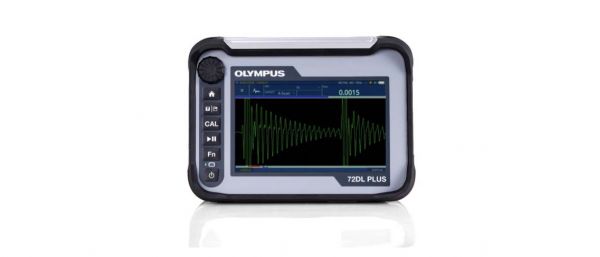
72DL PLUS
The 72DL PLUS™ advanced ultrasonic thickness gauge delivers precision thickness measurements at high speed in a portable, easy-to-use device. Compatible with single element transducers up to 125 MHz, this innovative thickness measuring tool is ideally suited to determine the thickness of ultra-thin materials, including multilayer paint, coatings, and plastic. It can simultaneously display the thickness of up to 6 layers.
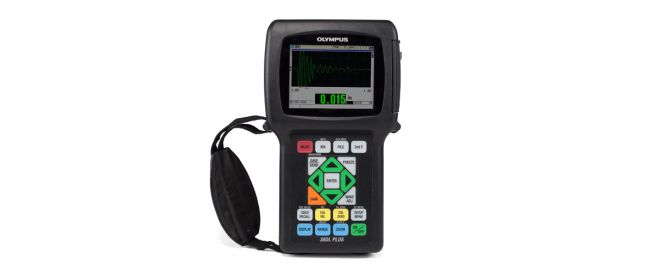
38DL PLUS
The versatile 38DL PLUS™ gauge can be used with dual element transducers for measuring the thickness of corroded pipes to very precise thickness measurements of thin or multilayer materials with a single element transducer.

45MG
The 45MG advanced ultrasonic thickness gauge is packed with standard measurement features and software options. This unique thickness measuring tool is compatible with our complete range of dual element and single element thickness gauge transducers.

Magna-Mike 8600
The Magna-Mike™ 8600 Hall-effect thickness gauge uses a magnetic probe to accurately measure the thickness of nonferrous and thin materials such as plastic bottles.
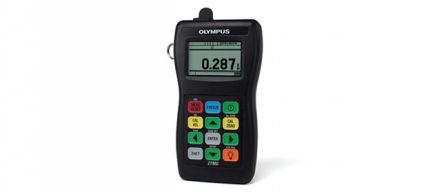
27MG
The 27MG basic ultrasonic thickness gauge is designed to accurately measure thickness from one side on internally corroded or eroded metal pipes and parts. It is lightweight, durable, and ergonomically designed for easy, one-hand operation.

35RDC
The 35RDC composite damage checker is a simple go/no-go ultrasonic gauge designed to detect subsurface defects caused by impact damage on aircraft composite structures.
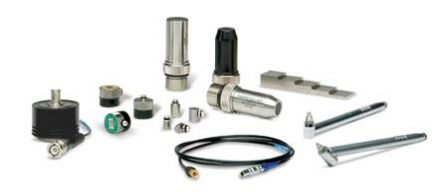
Transducers and Accessories
Evident offers a variety of single and dual element transducers and accessories for precision and corrosion thickness gauging.
Thickness Gauge FAQ
What is a thickness gauge?
A thickness gauge is a device used to quickly and easily measure the thickness of a material. A thickness gauge is useful for many industries but is most commonly used in engineering and manufacturing to help ensure material thickness complies with industrial standards and regulations. As well as measuring the thickness and density of a material, a thickness gauge can be used as an additional quality assurance tool in industries such as automotive manufacturing to measure the uniformity of the material and help identify hidden damages or imperfections.
How much does a thickness gauge cost?
Different factors can affect the price and cost of a thickness gauge, such as the transducer frequency, thickness measurement application, and software capabilities. We offer free quotes and demos so that you can test and evaluate gauges pre-purchase; contact us to learn more.
What is a Hall-effect thickness gauge?
Hall-effect thickness gauges, such as the Magna-Mike™ 8600 gauge, use a sensor that responds to changes in a magnetic field by varying a voltage. Using a small magnetic target, these gauges can accurately measure the thickness of nearly any nonmagnetic material where a probe can be placed on one side and a target, like a steel ball, on the other. Hall-effect gauges are also called magnetic thickness gauges.
How do you measure pipe thickness?
If you’re looking to measure the thickness of a pipe, an ultrasonic thickness gauge should be used. A handheld thickness gauge, such as the 27MG gauge, will offer accurate measurements from one side of metal pipes and parts that are thinning due to erosion or corrosion.
How do you measure metal thickness?
To accurately measure the thickness of a metal without damaging it, an ultrasonic thickness gauge should be used.
What is mil thickness?
A mil (or thou) is a unit of thickness that equals one thousandth of an inch (0.001 inches). Example: 10 mils = 0.010 inches. Mil thickness is commonly used in manufacturing in non-metric countries to measure the thickness of various thin materials, such as paint layers, thin films, foils, plastic sheets, and coatings.
What is micron thickness?
A micron (µm) is a small unit of thickness that equals one-millionth of a meter (0.000001 meters) and one-thousandth of a millimeter (0.001 millimeters). Micron is the shortened word for micrometer and is the closest metric unit to a mil (25.4 microns = 1 mil).
How do you check paint thickness?
Ultrasonic thickness gauges can measure paint thickness nondestructively. For example, high-frequency thickness gauges such as the 72DL PLUS instrument offer features that can calculate total paint thickness and simultaneously display paint thickness measurements of up to six individual layers. Paint thickness is expressed in mils or microns.
How do you measure plastic thickness?
To measure the thickness of plastic nondestructively, a Hall-effect or ultrasonic thickness gauge should be used. The thickness of plastic is often expressed in mils or microns.
Thickness Gauge Resources
Ultrasonic Thickness Gauge TutorialGet a better understanding of ultrasonic thickness gauges, including a brief history of them, their benefits, and how they work.. |  |
Measuring Coating Thickness on Composite AircraftDiscover how ultrasonic thickness gauges are used to measure the total thickness and individual layer thickness in multilayer coatings on aerospace composite. |  |
Measuring the Wall Thickness of Small-Diameter Metal and Plastic TubingExplore how to obtain the wall thickness and concentricity of small-diameter metal and plastic tubing. Learn about the ultrasonic thickness gauge equipment and the procedures used to take small-diameter tubing measurements. | 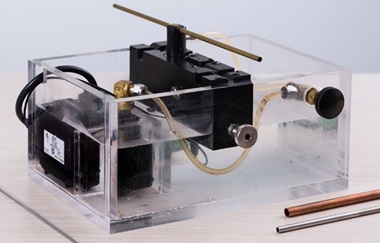 |
Measuring the Thickness of Glass Products and CoatingsLearn how to measure the wall thickness of commercial glass products, such as bottles, containers, tubing, sheets, plates, scientific glassware, bulbs, and lamps, as well as the thickness of glass coatings on glass-lined tanks | 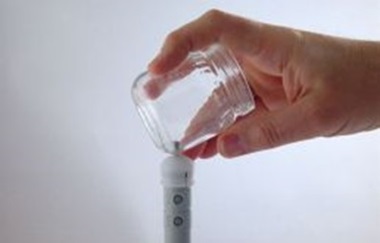 |
Thickness Measurements on Rubber Sheets and CoatingsDiscover how ultrasonic thickness gauges enable measurements on any point on the surface of a rubber sheet—not just the edges—without contacting the opposite side. |  |

